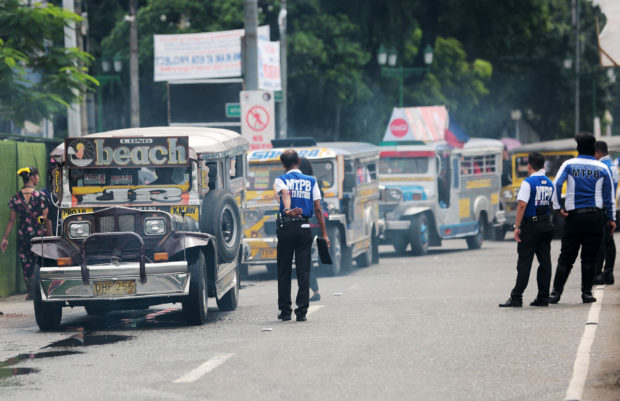
NOWHERE IN SIGHT Jeepneys are still seen plying their routes in this file photo before the quarantine. —GRIG C. MONTEGRANDE
Starvation might light the match that could start a fire within the jeepney sector, transport groups warned on Friday, if the government continues to ignore pleas for aid by the thousands of jeepney drivers and operators displaced by the monthlong, Luzon-wide suspension on transportation.
According to Pinagkaisang Samahan ng mga Tsuper at Operator Nationwide (Piston) chair emeritus George San Mateo’s estimates, around 500,000 jeepney drivers and 200,000 small-time operators are among the hardest-hit by the enhanced community quarantine (ECQ) imposed by President Duterte upon the entire island of Luzon on March 16.
Protests could erupt
The ECQ had been the draconian response to the swiftly rising number of new coronavirus disease (COVID-19) cases in the country. Also ordered shut down was public and mass transportation until April 14, which the interagency task force on emerging infectious diseases said was the fastest way to spread the virus because of the lack of social distancing.
Mateo warned of “spontaneous protests” that could erupt within the sector “unless the government acts swiftly and prudently in assisting the displaced.”
Echoing his sentiment, Acto president Efren de Luna said several drivers right now do not have other means of income because of the rapid spread of the virus even within their hometowns.
“Our sector is asking our officials right now to provide us aid since we are among the biggest contributors to excise tax and e-VAT (expanded value-added tax)—almost P3 for every time we refill our vehicles with gas,” De Luna said.
As of March 27, the Department of Transportation (DOTr) has not released a comprehensive plan for aid for the sector.
However, city governments like Pasig and Makati have been releasing one-time subsidies for both jeepney, tricycle and UV drivers affected by the shutdown.
“If the labor department, city governments, Philhealth, SSS (Social Security Systems), and other GOCCs (government-owned and -controlled operations) are able to mobilize and give aid to their own sectors, the DOTr and the Land Transportation Franchising and Regulatory Board have remained mum about this,” De Luna said.
Mateo said the lack of subsidies was a symptom of the “lack of comprehensive, integrated and national plan to help the sector through the coordination of both national, local government, and barangays and transport groups, to distribute aid on the ground.”
Red tape
“I think bureaucratic red tape is among the chief reasons why [there is no aid yet], and besides it’s really beyond the capacity of the city government and their barangays,” Mateo said.
“Because of this, you cannot blame the drivers and even other blue-collar workers who are forced to go out and look for a means of income just to get by,” he added.